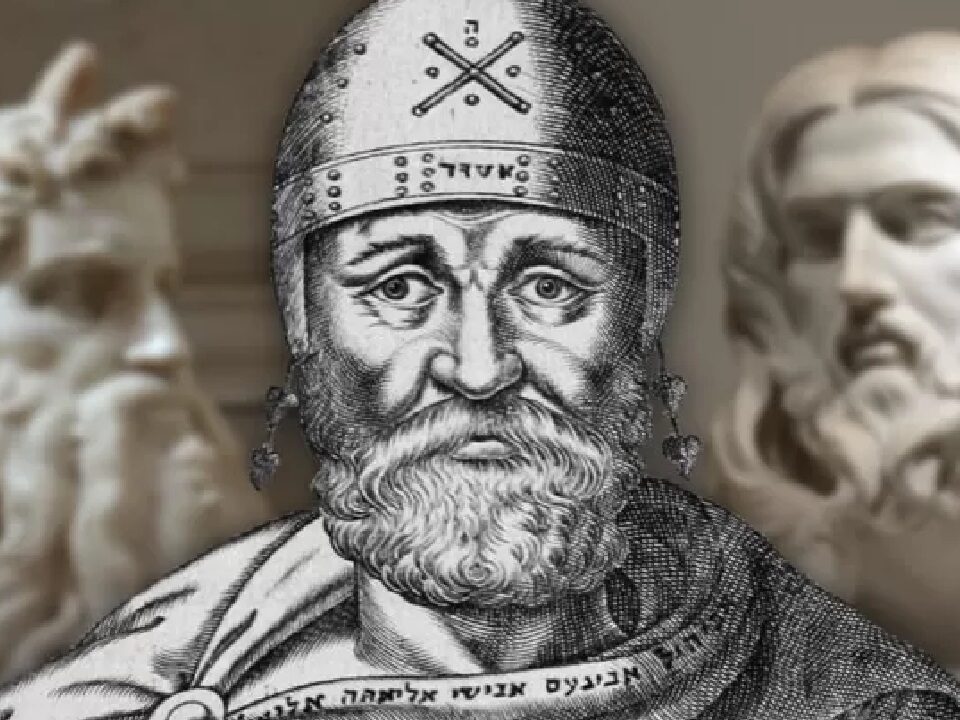
“Christmas” from The Encyclopedia Britannica
December 4, 2016
Was Jesus Born in Winter?
December 4, 2016The Impressiveness of Jesus

By Patrick Navas
In my view Jesus himself poses the greatest challenge to atheism, and the most convincing reason for having faith in God. Why do I say that? Jesus of Nazareth was a real person in history. He cannot be “wished” out of existence, though many have expressed this wish. He lived long before the modern era, came from an obscure village in a remote part of the Roman Empire, was a religious heretic in the eyes of the Sanhedrin (another messianic pretender), and an ordinary criminal, or rabble rouser, in the eyes of Rome. He owned no property, had no formal education, wrote no books, preached for only about 3 years, probably never traveled more than 200 miles from his place of birth, and only lived to be 33 years old, dying a cruel death at the hands of the state through the instigation of the religious authorities.
His followers claimed, subsequently, that he came back from the dead, appeared to them in person, and ascended into heaven with the promise to appear again; all of which formed the basis for their dedicating their lives to the spread of his message. Though regarded by the world as nothing more than a soon-to-be-forgotten, crucified blasphemer and criminal, his followers declared him to be “Lord of all” (Ac 2:34-46; 10:36; Phil 2:11). 2000 years later, Jesus is a universally-respected figure. The authority and power with which he spoke was sublime. His teaching and example transcend time and command respect across all racial, cultural and religious lines. Religious movements of all kinds have sought to use his name (his established credibility and reputation) as a basis for their own authority and teachings. Thousands have wanted to claim him as their own and as having his backing. His name is, truly, the most venerable in human history. Jesus is clearly special. Nowhere in the Gospel accounts do I find him to sound (as many religious figures today and throughout history) like an obnoxious fundamentalist, a religious fanatic, a charlatan, or a lunatic, but like a profoundly wise and uniquely enlightened man who uttered words of truth with authentic authority, even calling himself the very embodiment of it (‘I am the way, the truth, and the life’ Jn 14:6). Somehow, he was able to make unprecedented exalted and exclusive claims about himself without sounding arrogant or egotistical: I am the bread of life; whoever comes to me shall not hunger, and whoever believes in me shall never thirst. —Jn 6:35 I am the living bread that came down from heaven. If anyone eats of this bread, he will live forever; and the bread that I shall give is my flesh in behalf of the life of the world. —Jn 6:51
I am the resurrection and the life. Whoever believes in me, though he die, yet shall he live, and everyone who lives and believes in me shall never die. —Jn 11:25-26 When Jesus made authoritative claims about himself, he backed them up with a power and logical force that, even to modern ears, carry the “ring of truth” that commends itself to the human heart—leaving one, at least me, with an overwhelming impression of integrity and trustworthiness: For this I have been born, and for this I have come into the world, that I should bear witness to the truth. Everyone who is on the side of the truth listens to my voice. —Jn 18:37
As a well-read, experienced and profoundly sensitive student of religion and philosophy, you say: I agree that from what we have to go by, Jesus is depicted as an extremely impressive figure. And, it’s no doubt that the NT documents have forever changed the course of our history. The teachings of Jesus are indeed powerful and he is certainly depicted as an enlightened being. I really don’t think he was a liar or a lunatic but I don’t think that my only alternative now is to say that he’s lord – much to the chagrin of C.S. Lewis. Maybe Jesus was just mistaken about himself (or maybe just his biographers were mistaken). A person can be ethical, loving, and maybe even capable of doing some extraordinary things, but still be mistaken about his/her own identity. I’m grateful that you recognize Jesus’ impressive role as an historical and enlightened spiritual figure, at least as he’s depicted by his biographers. I don’t think, however, that the claims of Jesus reasonably lend themselves to the notion that he could have, somehow, accidently or mistakenly made the kind of claims that he did. His claims were far too particular and his teachings far too cogent and comprehensive for this to be a viable alternative, as far as I can see. If he did claim to be the truth, and the way to God, as his biographers tell us, yet was not, he was certainly delusional (a religious crackpot) or a liar (a religious fraud). In the John’s Gospel, Jesus claimed, very plainly, that he came into the world to bear witness to the truth and that he was sent by God for this special purpose. It is difficult for me to believe that these claims (whether one believes he was sincerely mistaken, or that these words were put into his mouth by his biographers, or that he was a madman) are, in the final analysis, a lie. In this dark, cruel and often senseless world we find ourselves living in, Jesus shines brightly in the annals of human history and among lost mortals with the declaration: I am the light of the world; he who follows me will not walk in darkness but will have the light of life. —Jn 8:12
Who else but Jesus of Nazareth stands out among the beleaguered human race as a beacon of light in a dark sea of ignorance and hopelessness? In another place he is reported to have said: Whoever puts faith in me puts faith not only in me but in him who sent me; and whoever sees me sees him who sent me. I have come as a light into the world, in order that everyone putting faith in me may not remain in the darkness. If anyone hears my sayings and does not keep them, I do not judge him; for I did not come to judge the world, but to save the world. He who rejects me and does not receive my sayings has one who judges him; the word that I have spoken is what will judge him at the last day. For I did not speak on my own initiative, but the Father himself who sent me has given me a commandment as to what to say and what to speak; and I know that his commandment is eternal life; therefore the things I speak, I speak just as the Father has told me. —Jn 12:44-50
His exclusive messianic and spiritual proclamations—as grandiose as they are, and as scandalously heretical as they were to the religious leaders of his day—have the credible and believable quality that inspire confidence that his words are “trustworthy and true” (Rev 21:5). As a teacher of spiritual wisdom, Jesus projects the spirit of one who is “gentle and lowly in heart,” and, in harmony with the good shepherd parable, proves himself willing, in contrast to the “hired hand,” to “lay down his life for the sheep” (Matt 11:29; Jn 10:1-18). All that he did, according to the NT witness, was in obedience to the will of the Father who sent him (Jn 4:34; 5:30; 6:38; 8:29). It is with good reason that John’s Gospel describes his glory as that of “an only Son from the Father, full of grace and truth” (Jn 1:14); and it was with soundness of mind that the apostle Paul said of Jesus: “In him are hidden all the treasures of wisdom and knowledge” (Col 2:3).
Unlike some of the first-century scribes and Pharisees (and many of the religious leaders and religious systems of our own time), Jesus was not a smug, self-righteous or self-appointed religious authority who desired the praise of men or power over others. Instead, Jesus associated with sinners and showed solidarity with the poor, the afflicted, the outcast—the lowliest among society. Neither did Jesus intend to establish an authoritarian religious institution, but came to “set the captives free” from the burdens of spiritual bondage and religious oppression, with the spiritually-refreshing invitation: “Come to me, all of you who are weary and carrying heavy burdens, and I will give you rest…” (Matt 11:28-30; Lk 4:18); and the hope-inspiring assurance: “Truly, truly, I say to you, whoever hears my word and believes him who sent me has eternal life. He does not come into judgment, but has passed from death to life” (Jn 5:24). The Gospel of John presents the following report: But when it was now the midst of the feast Jesus went up into the temple, and began to teach. The Jews then were astonished, saying, ‘How has this man become learned, having never been educated?’ So Jesus answered them and said, ‘My teaching is not mine, but his who sent me. ‘If anyone is willing to do his will, he will know of the teaching, whether it is of God or whether I speak from myself. ‘He who speaks from himself seeks his own glory; but he who seeks the glory of the one who sent him, he is true, and there is no unrighteousness in him. —Jn. 7:14-18 If the supreme God of creation sent an emissary from himself to make the truth about him known, that is, I believe, exactly what we might think an emissary of truth and embodiment of God’s love would sound like—righteous, loving, humble, authoritative, eloquent, and eternally wise. Albert Einstein (not a Christian, and certainly one of the most exceptional minds in human history), responded to a series of questions from an interviewer about Jesus of Nazareth in this way:
‘To what extent are you influenced by Christianity?’
‘As a child, I received instruction both in the Bible and in the Talmud. I am a Jew, but I am enthralled by the luminous figure of the Nazarene.’
‘Have you read Emil Ludwig’s book on Jesus?’
‘Emil Ludwig’s Jesus,’ replied Einstein, ‘is shallow. Jesus is too colossal for the pen of phrasemongers, however artful. No man can dispose of Christianity with a bon mot [i.e., ‘a witty saying’]’
‘You accept the historical existence of Jesus?’
‘Unquestionably. No one can read the Gospels without feeling the actual presence of Jesus. His personality pulsates in every word. No myth is filled with such life. How different, for instance, is the impression which we receive from an account of legendary heroes of antiquity like Theseus. Theseus and other heroes of his type lack the authentic vitality of Jesus.’
‘Ludwig Lewisohn, in one of his recent books, claims that many of the sayings of Jesus paraphrase the sayings of other prophets.’
‘No man,’ Einstein replied, ‘can deny the fact that Jesus existed, nor that his sayings are beautiful. Even if some of them have been said before, no one has expressed them so divinely as he.’
Likewise, as I continue to study and reflect on the Gospel accounts, I never cease being impressed by the wisdom, power and dignity of his person. The impact he has had on the course of human history, his abiding influence upon the hearts and minds of millions of thinking people to this very day, 2000 years later, is impressive indeed.
Though Jesus spoke divinely, he often expressed himself in ways that were deliberately designed to shock, disturb, provoke and confound his listeners (‘Unless you believe that I am he, you will die in your sins.’ Jn 8:24; ‘Whoever comes to me and does not hate his own father and mother and wife and children and brothers and sisters, yes, and even his own life, he cannot be my disciple’ Lk 14:26; ‘if your right eye causes you to sin pluck it out,’ Matt 5:29; ‘do not think I have come to bring peace to the earth. I have not come to bring peace but a sword’ Matt 10:34).
John’s Gospel similarly reports Jesus making the scandalous declaration: “Whoever feeds on my flesh and drinks my blood has eternal life, and I will raise him up on the last day” (Jn 6:54). The account indicates that it was because of these kinds of difficult words that many of his disciples withdrew themselves from him (‘This is a hard saying; who can listen to it?’ Jn 6:60). Near the end of the account Jesus reportedly said to the twelve: “You do not want to go away also, do you?” To which Peter responded, “Lord, to whom shall we go? You have the words of eternal life.”
In the midst of all the competing claims of various prophets and religious systems, and our own powerlessness before the shadow of death, Peter’s declaration bears the same spiritual relevance for truth-seekers and lovers of life today.
Most significantly, the NT does not portray Jesus a rogue or autonomous figure that appears on the scene of history out of nowhere, in a vacuum. He is portrayed, rather, as the fulfillment of God’s promise, the realization of prophetic expectation, indeed, as the Messiah—God’s beloved Son who said and did all that God commanded him. Jesus, as the fulfillment of God’s promise, and as the central figure in the outworking of God’s purpose, is the context in which his deeds and claims, and the apostles claims about him, must be understood: “according to [God’s] purpose, which he set forth in Christ as a plan for the fullness of time, to unite all things in him, things in heaven and things on earth” (Eph 1:9-10).
Jesus’ reported resurrection from the dead, the basis for the hope of eternal life, impelled his disciples to proclaim the gospel with great freeness of speech in the face of persecution and death. Today the resurrection continues to endow spiritual strength and the basis for sound hope among his followers; for in rising he has once for all shattered the power of death:
Moreover if the Spirit of the one who raised Jesus from the dead dwells in you, the one who raised Christ Jesus from the dead will also give life to your mortal bodies through his Spirit that dwells in you.
—Rom 8:11
The significance of Christ to our world cannot be overestimated, for only Christ so compellingly represents to humankind the very thing it needs—a savior. How true the prophetic word of Isaiah has proved to be concerning him:
In his name the nations will put their hope.
—Matt 12:21; Isa 42:1-4

